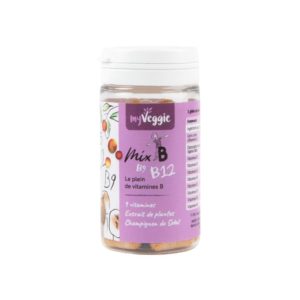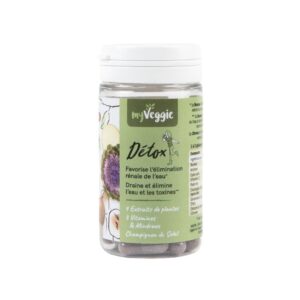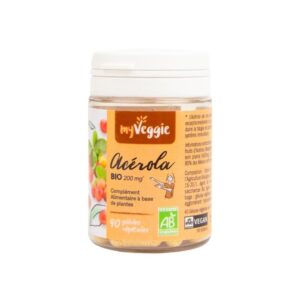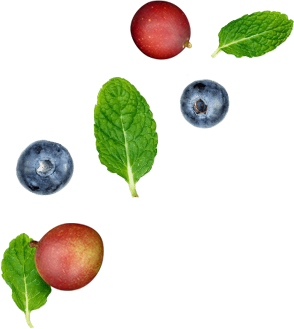Pregnancy is an important stage in a woman's life, we realize that we no longer live only for ourselves but that we have the responsibility of a little being growing inside us! We want to give the best to the child who is developing in our uterus but we don't always know what it needs. We find ourselves faced with a multitude of questions that can be a source of anxiety. And, very often we ignore our own needs, which should not be neglected because we share our physiological resources with our fetus for 9 months!
First of all, you should know that a pregnancy has to be prepared (in the best case!).
It is necessary to purify the body of its toxins before the period of conception because drainages will be contraindicated during the entire period of pregnancy and breastfeeding. This will prevent toxins from passing from the mother to the child through the placenta or breast milk.
I advise you to take myVeggie Detox food supplements for 3 weeks to prepare your body to welcome an embryo in the best conditions!
Also, make sure to eat as healthy as possible during pre-conception and pregnancy. Avoid substances known to be potentially teratogenic (risk of miscarriage) such as high doses of coffee, alcohol, tobacco, pesticides, heavy metals, synthetic molecules (such as drugs) or increased exposure to electromagnetic waves.
So pregnant, what nutritional supplements should I take during my pregnancy?
Nutritional advice for pregnancy, food supplements vitamins, minerals, iron
Did you know that according to a theory (concept of the 1000 days), the diet of the mother-to-be and the child until the age of 2 will have a fundamental importance on the health of the individual for the rest of his life? Hence the interest of an adapted diet from the beginning of conception!
And above all, forget the belief that you have to eat for two when you are pregnant!
Very quickly, the pregnant woman's body adapts and stores different elements (calcium, proteins, etc.) to cover the nutritional needs of the mother-to-be and her child, even if the fetus' needs are low at the beginning of the pregnancy.
After the 20th week of pregnancy, what has been set aside will be used for the development of the fetus and the mother, knowing that, in case of insufficient intake, priority will be given to the baby. The pregnant woman and the fetus have specific needs and it will be necessary to be vigilant with the contribution in :
- B vitamins (especially B9 and B12),
- Vitamin D (wheat germ, mushrooms),
- Vitamin C,
- Calcium (almonds, seaweed, fresh green vegetables),
- Iron (legumes, dried fruits),
- Iodine (algae)
- and omega 3 fatty acids (rapeseed, walnut, flax and hazelnut oils).
A cure of myVeggie Mix B according to your profile can be advised.
During pregnancy, protein requirements are increased for the development of the fetus and the placenta. A lack of protein can also lead to the appearance of stretch marks in the mother due to a lack of synthesis or destruction of elastin fibers (which are proteins).
You should also pay attention to an adequate intake of good quality carbohydrates because the baby needs them for brain development.
In the mother, insulin secretion is modified to use as little glucose as possible in order to reserve it for the fetus (this is similar to a state of physiological insulin resistance in pregnancy) which can be responsible for gestational diabetes if the intake of sugars is poorly managed. Therefore, avoid refined carbohydrates such as sugar, flour, pasta, white rice and prefer complex carbohydrates such as sweet potatoes, chestnuts, quinoa, buckwheat and wholemeal flour, pasta or rice.
Other tips for a healthy pregnancy
- At the beginning of pregnancy, nausea can appear, making it difficult to manage the first few months. Think about splitting your meals to facilitate digestion and if necessary take ginger-based supplements.
- Pregnant women can be physiologically prone to constipation problems. To remedy this, don't hesitate to use gentle methods based on flax seeds, psyllium, sugar-free prunes or plants such as mallow flowers or marshmallow.
- To relax and warm up, warm baths with a few drops of lavender essential oil mixed in neutral bath gel can do you good. Cool sitz baths (20°c) will help tone the perineum before and after childbirth.
- Pregnancy is a physiological state, not a pathological one; the practice of an adapted physical activity such as yoga, swimming, walking, Tai Chi is recommended in order to promote oxygenation, tone the perineum and work on opening the hips. Practice slow, deep, ventral breathing to help you control pain and anxiety during childbirth.
- To promote physical and nervous recharging, make sure you get enough sleep, take time for relaxation or mediation to refocus on yourself and get in touch with a sophrologist who will help you live your pregnancy serenely and prepare for your delivery.
Finally, don't forget to enjoy your pregnancy, be indulgent with yourself and know that the role of mother is not innate, it is acquired with time and if you put all your love, it will make you a great mom.
Pregnancy is a magical event. Pay attention to the signs your body is sending you. Always with professional advice, do not hesitate to choose your dietary supplement from our range of dietary supplements. products !














